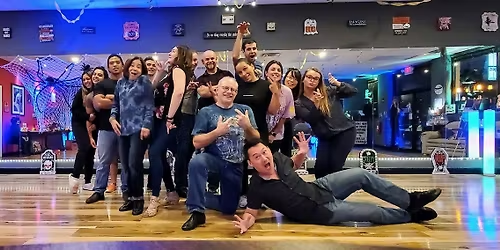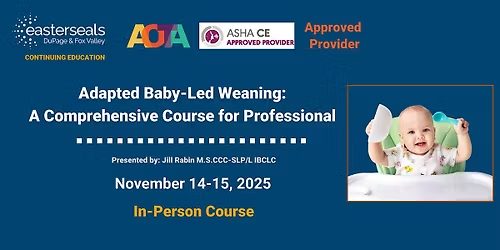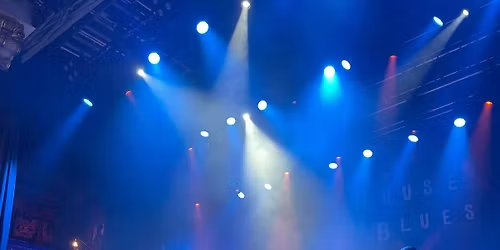
About this Event
To sign up and receive all course information and future courses from Easterseals, please click here to sign-up.
Target Audience:
This course will be of interest to speech pathologists, occupational therapists and dietitians who work with the 0 to 3 population.
Course Description:
This comprehensive two day in-person course taught by speech pathologist and international board-certified lactation consultant, Jill Rabin, will explore the history of infant feeding and the impact of cultural changes on our feeding intervention with infants to three-year-olds today. The focus of the course will be on the implementation of child-directed and responsive feeding techniques such as baby-led weaning and adapted baby-led weaning in facilitating feeding skill development in babies with feeding challenges.
A baby-led weaning approach is often discouraged by health care professionals as it is often deemed unsafe, especially in babies with feeding challenges. Back in 2010, the adapted baby-led weaning approach® (ABLW) was created by Jill Rabin. ABLW follows all the same principles of traditional BLW, however, certain modifications are made such as possible delayed introduction to solids, careful selection of the size, shape and texture of foods to present based on the baby’s feeding skill set, and use of bridge devices such as a silicone feeder or netted feeder, to safely target chewing skills. This course will extensively explore the adapted baby-led weaning approach and how it can systematically and safely be implemented, using the size, shape and texture of foods therapeutically.
Participants will learn about the extensive benefits of ABLW with babies with feeding challenges in regard to self-feeding skills, intuitive eating, eye-hand coordination and chewing skill development. Other topics that will be explored include: how ultra-processed foods can impact the health and oral structural development of babies, how to offer allergenic foods with babies with delayed feeding skill development, how feeding skill development may differ in babies transitioning to solid foods with BLW from those of their traditionally spoon-fed peers, and how we can present foods and liquids to babies to facilitate skills such as jaw strength, lip closure, cheek activation, and tongue lateralization and retraction.
Video and in person demonstrations will teach participants how to safely implement adapted baby-led weaning techniques in babies with Down syndrome, babies who are tube fed, babies with feeding aversion, babies with cleft lip/palate and babies with dysphagia. Participants will leave this course with a fresh perspective and evidence-based references on using an adapted baby-led approach® with their feeding challenged and at-risk clientele. They will have an extensive new repertoire of techniques to attempt with their clients and understand how to safely offer the size, shape and texture of different family foods to safely facilitate feeding skill development. The adapted baby-led weaning approach® can be used safely and effectively with most babies with feeding difficulties with the guidance of a trained feeding therapist.
Location:
Course will take place at Easterseals DuPage & Fox Valley (830 S. Addison Ave. Villa Park, IL, 60181).
About the Instructor:
Jill Rabin M.S. CCC-SLP/L IBCLC is an ASHA certified, state licensed pediatric speech-language pathologist, early intervention evaluator and therapist, and international board-certified lactation consultant. She is the co-author of the book “Your Baby Can Self-Feed, Too!” which is about her adapted baby-led weaning approach®. Jill has been a hospital-based speech pathologist and lactation consultant in 3 different Chicagoland hospital and
has been working with infants to 3-year-olds with feeding challenges since 1986. Currently, she has a private practice in the north suburbs of Chicago. Areas of specialty include: working with complex breastfeeding dyads, facilitating breastfeeding in at-risk or medically complex babies, co-moderating a breastfeeding support group for pregnant, pumping and breastfeeding moms with babies with Down syndrome, coaching families on how to transition to solids using BLW or ABLW, and using responsive feeding methods with babies with feeding aversion. Jill lectures nationally and internationally on managing bottle refusal in breastfeeding babies and use of the adapted baby-led weaning approach®. Jill is part of a research team based out of the University of Wisconsin-Milwaukee that is collecting date to look at how adapted baby-led weaning contributes to self-feeding and diet quality for children with Down syndrome. Jill volunteers for GiGi’s Playhouse-Deerfield in doing their LMNOP speech/language group for infants to 3-year-olds and specializes in working with babies with Down syndrome.
Financial Disclosures:
Jill Rabin has the following financial relationship to disclose: she receives a fee for speaking from Easterseals DuPage & Fox Valley.
Non-Financial Disclosures:
Jill Rabin has no relevant non-financial relationships to disclose.
Learning Objectives:
1. Participants will define Adapted Baby-Led Weaning and its key features and how it differs from traditional baby-led weaning.
2. Participants will list at least 2 ways to prepare for the introduction of solids in the first six months of life.
3. Participants will list some of the benefits of adapted baby-led weaning for babies with feeding challenges.
4. Participants will list how bridge devices are used to facilitate self-feeding and feeding skills in babies with feeding challenges.
5. Participants will explain how to present different food shape, size and textures to target specific self-feeding and chewing skills.
Course Schedule:
Friday, November 14
Day One:
8:00-8:30am: Registration and Check-in
8:30-8:45am: Introduction
8:45-9:30am: History of infant feeding
9:30-10:00am: Cultural feeding practices and their impact on feeding intervention
10:00-10:15am: Break
10:15-10:30am: Environmental Influence on Food/Ultraprocessed Food
10:30-10:45am: How the Food We Eat Shapes Our Face
10:45-11:30am: Prefeeding Skill Development
11:30am-12:00pm: Determining Readiness to Start Solids
12:00-1:00pm: Lunch
1:00-1:15pm: What is Baby-Led Weaning?
1:15-1:30pm: Key Features of BLW
1:45-2:00pm: What is Adapted Baby-Led Weaning?
2:00-2:15pm: How Does BLW Differ from ABLW?
2:15-2:30pm: Benefits of ABLW for Babies
2:30-2:45pm: Break
2:45-3:30pm: Populations That Can Benefit from Adapted Baby-Led Weaning
3:30-4:00 p.m.: Question and Answer; Wrap-Up
4:00 p.m.: Dismiss
Day two:
8:00-8:30am: Registration and Check-in
8:30-8:45am: Getting Started with Adapted Baby-Led Weaning
8:45-9:15am: Use of Popsicles, Food Strips and Preloaded Spoons
9:15-9:30am: Food Strips versus Food Teethers
9:30-9:45am: Textured Food Mashes (Offering Allergens and Color)
9:45-10:00am: Different Types of Food Strips: Firm, Soft Solid, Meltable and Resistive
10:00-10:15am: Break
10:15-10:30am: Partially Exposed Foods
10:30-11:00am. Use of Bridge Devices
11:00 a.m-12:00pm: Live demonstration of ABLW Techniques with a Baby
12:00-1:00pm: Lunch
1:00-1:30pm: Offering Liquids Therapeutically to Teach Skill
1:45-2:30pm: Use of size, shape and food texture to target: lips, jaw, tongue and cheeks
2:30-2:45pm: Break
2:45-3:45pm: Case Studies of Babies using ABLW: Dysphagia, Faltering Growth, Tube Fed Babies, Down Syndrome, Feeding Aversion and Cleft Palate
3:30-4:00pm: Question and Answer; Wrap-Up
4:00pm: Dismiss
Continuing Education Credits
Continuing education credits for O.T./ Dietitans / SLP will be offered through the Illinois Department of Financial and Professional Regulation. Early Intervention credits, AOTA and ASHA have all been applied for 14 contact hours or 1.4 CEUs.
All participants will receive a course completion certificate upon successful completion of the conference. No certificates will be awarded until course completion is verified on the final date of the conference.
Event Venue & Nearby Stays
Easterseals DuPage & Fox Valley, 830 South Addison Avenue, Villa Park, United States
USD 462.30 to USD 472.78







